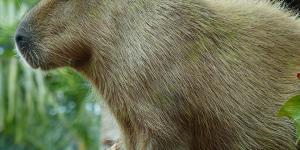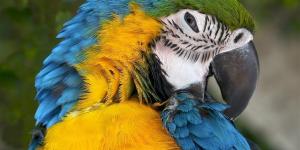Keeping Pigeons as Pets - Full Care Guide

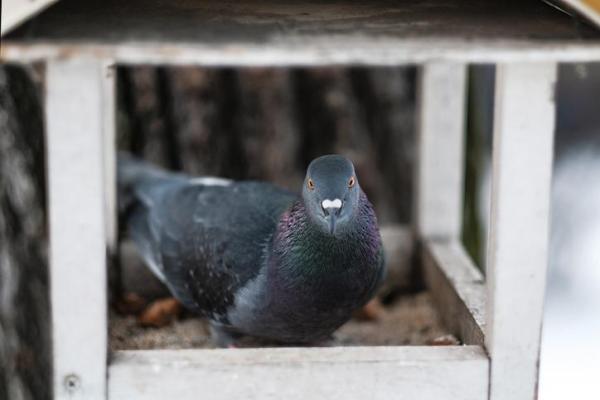
Pigeons are a curious group of animals that can generate completely opposite emotions in humans. While some regard them as an urban pest, many admire them for their remarkable beauty and cognitive abilities. Keeping pigeons as pets is associated with a long tradition of pigeon of pigeon fanciers. This group of animal caretakers not only created intricate lofts for keeping pigeons, but their level of care and use of pigeons is considered a science in its own right. Some use them for racing and they have been historically used to help win wars.
Such a distinguished history and the level of responsibility it seems to require means some people are intimidated by the idea of keeping pigeons as pets. At AnimalWised, we explain these responsibilities in detail with our pet pigeon care guide so you can know if it is something to which you might want to dedicate yourself.
- Characteristics of pigeons
- Behavior of pigeons as pets
- Basic pigeon care
- Pet pigeon housing
- Ideal temperature and humidity for pigeons
- Caring for pet pigeon hygiene
- Pet pigeon feeding and diet
- Forbidden foods for pigeons
- Physical and mental stimulation for pet pigeons
- Preventive medicine for pet pigeons
- Pet pigeons and diseases
Characteristics of pigeons
The term ‘pigeon’ is popularly used to describe various birds belonging to the Columbidae family, which includes more than 300 species of both pigeons and doves. Currently, more than 150 breeds of pigeons are known to inhabit all continents, with the exception of Antarctica. This reminds us of the importance of knowing each breed of pigeon and its specific needs before deciding to adopt a pigeon as a pet.
The pigeons we most commonly find on the streets of large cities are rock pigeons (Columba livia). These are also the breed of pigeon most commonly kept as pets. While it is no longer an effective method of communication, these birds have previously been used as messengers due to their great sense of orientation and intelligence.
In terms of anatomy, these birds are characterized by their very robust chest, small head and short beak. The wings are very strong and relatively large compared to the length of their body. Their legs are short, thin and have four toes, one of which is opposable (similar to a human thumb). The plumage of the pigeons is soft, presenting different shades and color combinations according to the pattern of each species.

Behavior of pigeons as pets
It is not only dogs and cats that can be excellent companions in our home. Although we are not used to thinking of the pigeon as a pet, these intelligent animals are both very social and show a good predisposition to training. This promotes healthy interaction with humans. At the same time, they are independent birds which need moments of freedom to fly and explore the world around them. They can become sick and develop behavioral problems if kept indoors.
This need for freedom of flight is one of the reasons why pigeon racing is a sport (some say an art) that is still popular in many corners of the world. In fact, after a serious decline during the 20th century, pigeon fancying has developed somewhat of a renaissance in countries like the United States.
Raising and training pigeons is a rewarding experience, but also a challenging one. Many pigeon fanciers will devote much of their lives to caring for pigeons. Keeping pigeons as pets is not the same as keeping a cat which is a relatively independent animal. It is a task which requires not only passion, but patience, time, money, space and the right disposition to provide the optimal living conditions for pigeons.
Many people also wonder if a pigeon can be aggressive and if it is possible to avoid inappropriate behavior in these birds. As with all animals, the behavior of pigeons will depend largely on the environment and the education offered by their keepers. If we want to have balanced and calm pigeons at home, we must provide them with optimal nutrition, adequate preventive medicine, an environment favorable to their development, and adequate physical and mental stimulation. It is also a task which requires guidance from an professional bird training expert to help us educate our pigeons from an early age.
Basic pigeon care
As with all pets, pigeons also have some basic care needs to enjoy a healthy, happy and active life. In general terms, we can divide the essential care of a pet pigeon 5 categories: environment, feeding, hygiene, stimulation and preventive medicine. In the following sections, we will look at each one in more detail.
Pet pigeon housing
All animals need to live in a positive environment, i.e. somewhere they find optimal conditions to develop their body and mind. Before deciding to adopt a pigeon as a pet, you will need to prepare the space they live so they can be comfortable.
Although pigeons enjoy being loose and free, they must have their own cages or lofts where they can take refuge, sleep and rest. Your first step will be to go to a specialized bird store to acquire the appropriate cages or lofts for the size of the breed of pigeon you have chosen to adopt.
Pigeons are sociable and live in small communities, but you must be very careful not to overpopulate the lofts. This can cause coexistence problems. It is generally recommended to keep only 2-5 birds together in each cage. However, we should always keep pigeons at least in pairs, never on their own.
To promote the hygiene of the cage, we can line the bottom with clean sheets of newspaper or other absorbent paper, We will also top it with sand or even something like cat litter can work if it is safe for pigeons. We can also leave some straw, coconut hair, twigs or light stones to better condition the cage. This better recreates their natural habitat and the birds will be able to use these elements when making their nest.
In each cage, your pigeons must find a food dish and water source appropriate to their size and morphology. Stainless steel feeders are more reliable and hygienic as they can be easily washed and disinfected. Dripper water bottles with balls (such as those used for hamsters) are also wise as they allow the water to remain in good condition for longer, without becoming contaminated with impurities from the environment or heating up quickly.
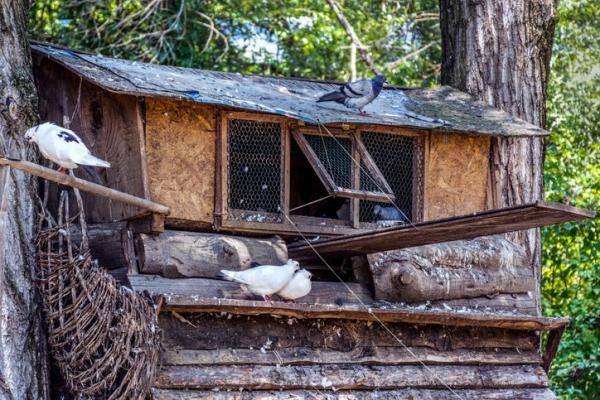
Ideal temperature and humidity for pigeons
In addition to preparing the interior of the cage for pigeons, its placement is vital. The first thing to do before choosing where to put the cage will be to guarantee that your birds are not exposed to the elements, as well as being protected from adverse weather conditions or possible predators. You will need to sanitize and disinfect this entire environment to eliminate impurities and possible pathogens.
As pigeons tend to prefer warm or temperate climates, you should also pay attention to the air conditioning of their environment. The ideal temperature for pigeons is between 22-25 ºC (71-77 ºF) in the mornings and 16-20 ºC (60-68 ºF) at night. Depending on where you live, you may need heaters during winter to protect your pigeons from the cold.
We must also be careful so the air does not get too dry and cause respiratory problems in the birds. To maintain a balanced humidity using heating, we can spray clean water two to three times a day at room temperature into the air. Never spray directly on the cages themselves or on the pigeons' feathers. The idea is to humidify the general air of the environment and not wet the birds.
Caring for pet pigeon hygiene
Hygiene is one of the most important aspect of caring for a pet pigeon. It will help us keep both our birds and ourselves healthy. Birds should not have direct contact with their droppings or live with leftover food and water in poor condition.
At least once a day you will need to wash the tray, the drinker and the feeder of your birds to avoid the accumulation of droppings or food remains on the bottom of the cage. The same applies for other objects in the cage. It is also important not to leave excess feed available in the cage as it will likely end up wasted at the bottom. We must sanitize the objects, accessories and the cage or pigeons 2-3 times per week.
Pet pigeon feeding and diet
As with all animals, pigeons need complete and balanced nutrition to grow properly and maintain good health. Feeding is essential for your pigeons to have a strengthened immune system and to develop not only their physical resistance, but also their cognitive abilities.
In the wild, pigeons follow a varied diet based mainly on the consumption of grains and seeds. These include corn, wheat, oats, sorghum, barley, lentils, rice, flax, carob beans, broad beans, sesame, millet, peas and sunflower seeds. When adopting a pigeon as a pet, it will be essential to provide them with a balanced diet according to their nutritional requirements.
In specialized bird stores or online you can find commercial feeds prepared especially for pigeons. These products are contain the balanced proportions of fats, proteins, carbohydrates, vitamins and minerals that pigeons need. It is also highly recommended we incorporate fresh and natural foods to complement the diets of pet pigeons.
Sprouts and grains, as well as beneficial vegetables and fruits, may be offered two or three times a week. We can also incorporate a cooked egg or sugar and lactose-free yogurt once or twice a week to guarantee a good supply of lean proteins. You can crush clean eggshell and mix it into the food of your birds once a week to supplement their mineral requirements.
Wheat germ oil is usually recommended as a supplement during the molting season in pigeons, but it is essential that its administration is accompanied by a specialist veterinarian. It is also important to consult a specialized professional before offering vitamin and mineral supplements to your birds to improve their immune system.
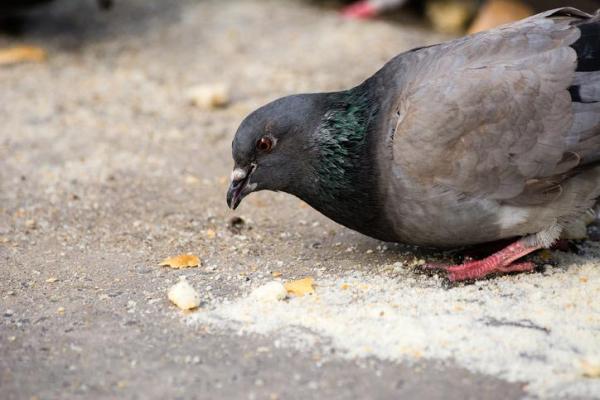
Forbidden foods for pigeons
Although pigeons can adapt to a varied diet, there are foods and drinks that can be toxic to their body. For example:
- Processed, fried or artificially flavored human food
- Chocolate and chocolate drinks
- Sugary and carbonated drinks
- Avocado, apple or pear seeds
- Onion, garlic, leek, and the like
- Salt, sugar and artificial sweeteners (or foods that contain them)
- Coffee and caffeinated beverages
- Human treats in general (candy, chewing gum, cookies, etc.)
Physical and mental stimulation for pet pigeons
As stated above, although pigeons are sociable and predisposed to interact with people and other birds, they are also independent animals that do not adapt well to confinement or constant harassment. It will be essential to have a safe space where you can release your pigeons so that they can fly, walk, interact and express themselves freely.
This will certainly lead you to wonder whether pigeons will return to their loft or cage. To ensure they do not fly away, you need to use positive reinforcement to reward birds when they quickly return home. Many keepers only release their pigeons before feeding them, so they can more easily attract them by offering their food.
In addition to flying and moving freely, it will also be essential to provide an enriched environment that stimulates the mental health of pigeons. Do not forget your birds are very intelligent and have very sharp senses. A sedentary and boring life is highly detrimental to their physical and mental well-being. You will need to train your pigeons to return. This is a complicated process and will require the help of a trained pigeon fancier.
Preventive medicine for pet pigeons
Last but not least, we must highlight the importance of offering adequate preventive medicine to your pigeons. In addition to making preventive visits to the veterinarian every six months, it will be essential to vaccinate your pigeons to help prevent the most common diseases in domestic birds. You will also need to regularly deworm them against internal and external parasites.
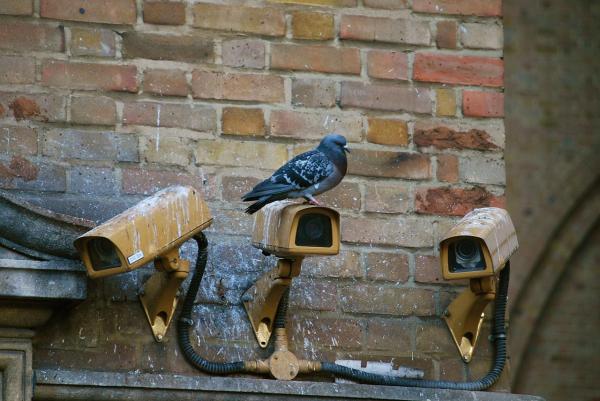
Pet pigeons and diseases
Unfortunately, there are many false beliefs about pigeons. Perhaps the most common is that they are dirty animals or urban pests that transmit many diseases to humans. They come into contact with various pathogenic agents and can consequently act as possible vectors of disease. This is true of any companion animal. Their hygiene is dependent on the environment in which they live and the food they eat, not innate characteristics of their organism.
Just like canaries, macaws or any other species of bird, pigeons are naturally clean and can become seriously ill if they do not receive proper hygiene, nutrition and deworming. When a pigeon is raised as a pet, lives in a clean and safe environment, maintains a fresh, healthy and balanced diet, and receives adequate preventive medicine, it does not represent a danger to humans.
Feral pigeons live in unsanitary conditions and often feed on human waste, such as spoiled food. Their body then becomes susceptible to the spread of bacteria, parasites, and other pathogens. For this reason, it is not recommended to pick up stray pigeons and immediately bring them to our home. If the animal is hurt, then you will need to take them to a veterinarian or local animal rescue. Otherwise they are wild animals which should remain free.

If you want to read similar articles to Keeping Pigeons as Pets - Full Care Guide, we recommend you visit our What you need to know category.


